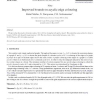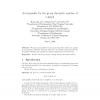117
click to vote
DM
2007
15 years 2 months ago
2007
We prove that the acyclic chromatic index a (G) 6 for all graphs with girth at least 9. We extend the same method to obtain a bound of 4.52 with the girth requirement g 220. We al...
116
click to vote
DM
2007
15 years 2 months ago
2007
—We give an inequality for the group chromatic number of a graph as an extension of Brooks’ Theorem. Moreover, we obtain a structural theorem for graphs satisfying the equality...
126
click to vote
CPC
2007
15 years 2 months ago
2007
Let P(G,t) and F(G,t) denote the chromatic and flow polynomials of a graph G. G.D. Birkhoff and D.C. Lewis showed that, if G is a plane near triangulation, then the only zeros of...
136
click to vote
DM
2010
15 years 2 months ago
2010
Let Mad(G) denote the maximum average degree (over all subgraphs) of G and let i(G) denote the injective chromatic number of G. We prove that if Mad(G) 5 2 , then i(G) + 1; sim...
104
click to vote
CORR
2010
Springer
15 years 2 months ago
2010
Springer
The packing chromatic number (G) of a graph G is the least integer k for which there exists a mapping f from V (G) to {1, 2, . . ., k} such that any two vertices of color i
CORR
2010
Springer
15 years 2 months ago
2010
Springer
Let mad(G) denote the maximum average degree (over all subgraphs) of G and let i(G) denote the injective chromatic number of G. We prove that if 4 and mad(G) < 14 5 , then i(G...
136
click to vote
IJCAI
1989
15 years 3 months ago
1989
It is well known that chromatic information can assist in solving the stereo correspondence problem. It has also been suggested that there are two independent first-order stereop...


